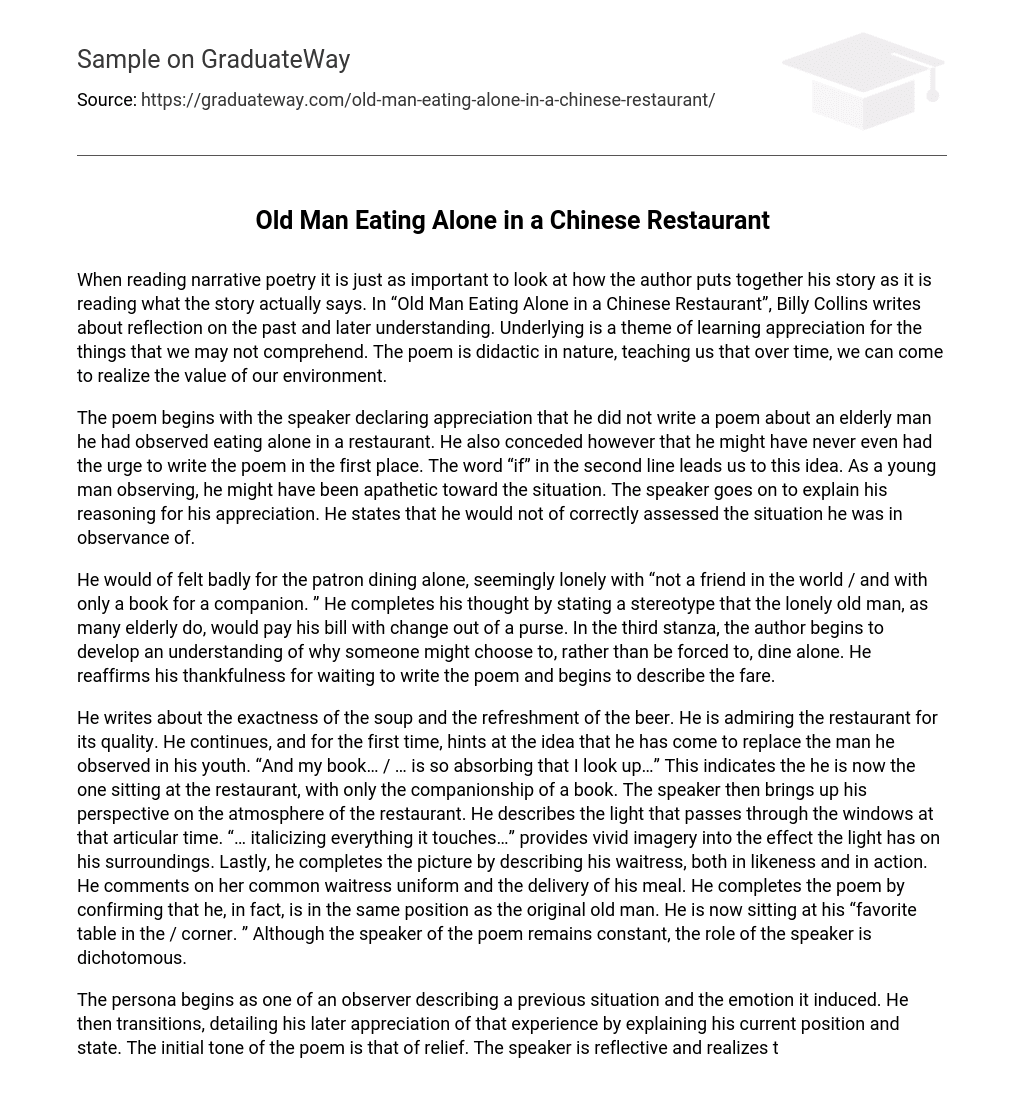When reading narrative poetry, it is equally important to consider the structure of the story as it is to understand its content. In “Old Man Eating Alone in a Chinese Restaurant,” Billy Collins explores the concept of retrospection and eventual comprehension. The poem reflects on the significance of recognizing and appreciating things that may initially be beyond our understanding. With didactic intent, this poem teaches us that with time, we can discover the value of our surroundings.
The speaker expresses gratitude for not writing a poem about an elderly man eating alone in a restaurant. However, they acknowledge the possibility that they may have never felt compelled to write the poem in the first place. The presence of the word “if” indicates this notion. As a young observer, the speaker might have been indifferent to the situation. They proceed to justify their gratitude by explaining that they would not have accurately interpreted the situation they were observing.
He would have felt sympathy for the patron eating alone, appearing lonely with “not a friend in the world / and with only a book for a companion.” He further implies that the elderly often pay their bill with change from a purse, reinforcing the stereotype of the lonely old man. In the third stanza, the author starts to comprehend why someone might willingly choose to dine alone instead of being forced to. The author expresses gratitude for waiting to write the poem and proceeds to describe the food being served.
The author praises the soup and beer for their excellence and refreshment at the restaurant. He expresses admiration for the establishment’s quality and subtly implies that he has taken the place of the man he once observed in his youth. The mention of his book suggests that he is now the one sitting alone at the restaurant, engrossed in reading. He then discusses his perception of the restaurant’s atmosphere, highlighting the light that streams through the windows during a specific time. He vividly describes how the light enhances everything it touches, creating a visually striking effect. Finally, he portrays his waitress, noting her typical uniform and how she delivers his meal. Ultimately, he confirms that he now occupies the same position as the original old man, sitting at his “favorite table in the corner.” While the speaker’s identity remains consistent throughout the poem, there is a dichotomy in his role as a narrator.
The persona initially observes and describes a past situation and the emotion it caused. However, the speaker’s tone shifts as he later appreciates that experience and explains his current position. In the beginning, the speaker feels relieved. Reflectively, he acknowledges that his initial impressions of the old man at the table were a result of his lack of understanding and appreciation compared to the old man. Upon reflection, the speaker remembers feeling sorry for the old man and labeling him as a “poor bastard.”
However, as the poem progresses, there is a shift in the speaker’s perspective and a growing empathy towards the elderly man dining alone. Additionally, the poem transitions from focusing solely on the old man to discussing the overall atmosphere of the restaurant. Despite this shift, the speaker maintains a positive attitude towards Chang’s restaurant, describing the cuisine and atmosphere in a pleasing manner. In particular, the speaker highlights the deliciousness of the hot and sour soup and mentions the friendly waitress who is now smiling.
More importantly than describing the persona’s environment, there is a tonal transition toward the old man. The persona now identifies with him as he describes all aspects of the restaurant, including the food, light, and furniture that the original subject would have observed. Overall, the tone appreciates both subjects of the poem, conveying a theme of understanding learning over time. Additionally, the persona in the poem narrates the reader’s position, teaching a lesson through recalling a previous situation and establishing a change in perception. In the first stanza, the persona admits to being “glad” they did not write about the subject earlier. Through explaining why, they prompt the reader to examine their own perceptions. The description of the old man aligns with society’s lens. The poem then transitions to reveal its theme and teach the lesson learned by the persona. Though it seems like a simple description of surroundings, it actually helps the reader reach a new conclusion about dining alone.
After examining the poem, it is my interpretation that Collins aimed to convey a story or portrayal, whether real or imagined, of the journey towards adulthood. As I grow older myself, I am able to reflect on specific circumstances with a fresh outlook. I believe the central message of the poem lies in recognizing our capacity to develop an appreciation for various aspects as time passes. As we progress in age, there is a shift in what we hold dear. Embracing and comprehending this transition will ultimately result in the revelation of a newfound sense of joy.





